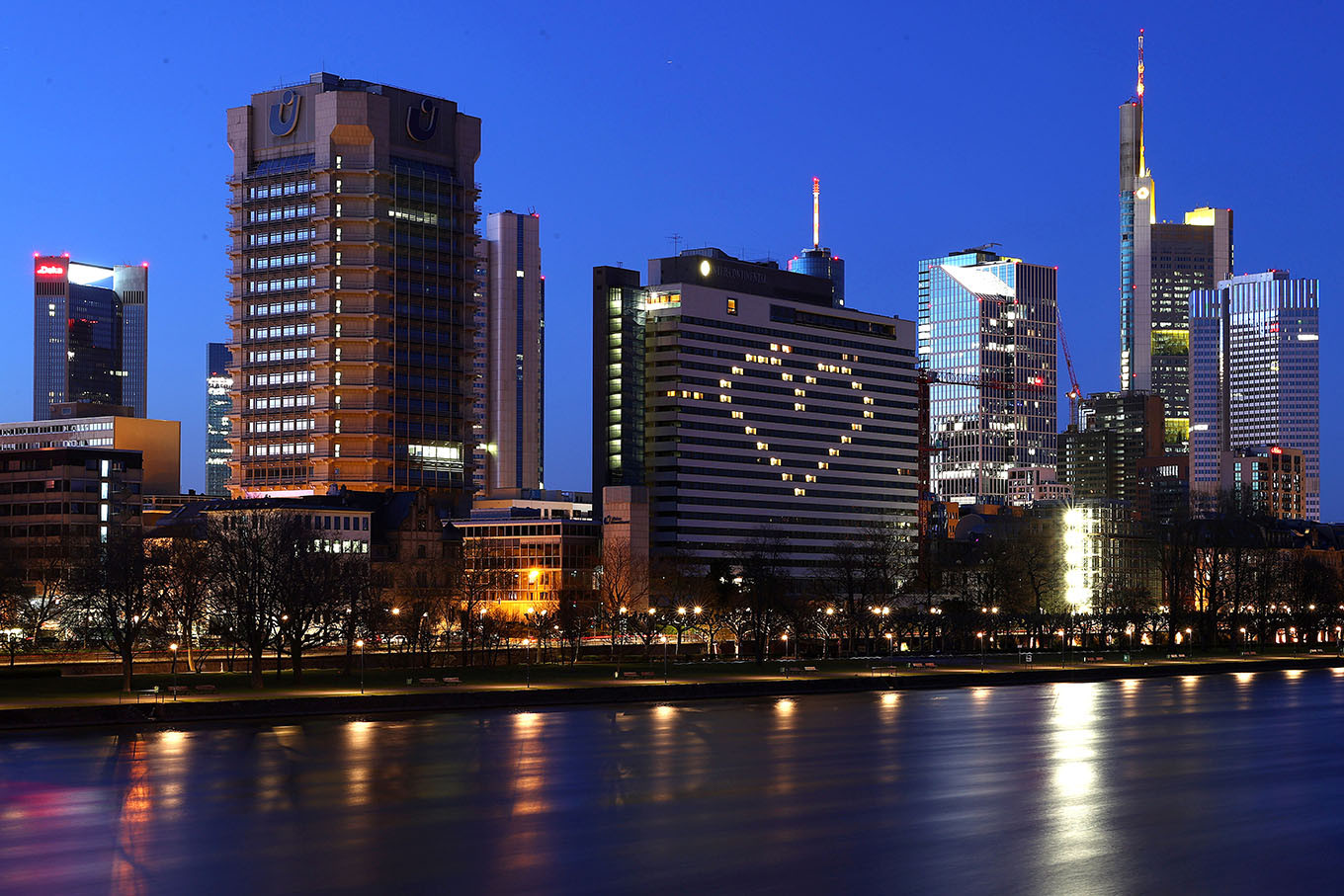Popular Reads
Top Results
Can't find what you're looking for?
View all search resultsPopular Reads
Top Results
Can't find what you're looking for?
View all search resultsGermany launches 750 billion Euro package to fight coronavirus
Change text size
Gift Premium Articles
to Anyone
 The window lights of a hotel are illuminated in the shape of a heart after German Chancellor Angela Merkel addressed the nation on the consequences of the spread of the coronavirus disease (COVID-19) in Frankfurt, Germany, on Sunday. Germany on Monday agreed a package worth up to 750 billion euros ($808 billion) to mitigate the damage of the coronavirus outbreak. (Reuters/Kai Pfaffenbach)
The window lights of a hotel are illuminated in the shape of a heart after German Chancellor Angela Merkel addressed the nation on the consequences of the spread of the coronavirus disease (COVID-19) in Frankfurt, Germany, on Sunday. Germany on Monday agreed a package worth up to 750 billion euros ($808 billion) to mitigate the damage of the coronavirus outbreak. (Reuters/Kai Pfaffenbach)
G
ermany on Monday agreed a package worth up to 750 billion euros ($808 billion) to mitigate the damage of the coronavirus outbreak on Europe's largest economy, with Berlin aiming to take on new debt for the first time since 2013.
The federal government's supplementary budget of 156 billion euros, which will be financed with new borrowing, underlines Berlin's determination to use "all we have" to reduce the impact of coronavirus, Finance Minister Olaf Scholz said.
"That's a very big package with a lot of measures," Scholz told a joint news conference with Economy Minister Peter Altmaier.
Germany would double the number of beds in its intensive care units, he added.
The Ifo economic institute said the country faced an unprecedented crisis due to the pandemic.
"The costs will probably exceed everything known from economic crises or natural disasters in Germany in recent decades," Ifo President Clemens Fuest said in a statement.
The government now expects the pandemic to plunge the economy into recession, with Scholz saying his budget plans were based on the assumption that gross domestic product would fall by roughly 5% this year.
Altmaier said the government wanted to get aid to companies as quickly as possible and that Berlin was ready to protect firms from insolvency as well as unwanted takeovers during the crisis with a newly created Economy Stabilization Fund.
"Make no mistake, we're determined to protect our companies and jobs," Altmaier said, adding that this message was directed at hedge funds.
Asked if Germany was planning a ban on short-selling of company shares like other European countries, Scholz said he would not speculate about such a step publicly in advance.
The cabinet earlier on Monday approved a raft of measures, including the stabilization fund draft law that foresees funds of up to 100 billion euros which can be used to take direct equity stakes in companies as a way to foil foreign takeovers.
The package includes another 100 billion euros in credit to public sector development bank KfW for loans to struggling businesses.
Debt authorization
The government will give the KfW bank debt authorization for both measures worth 200 billion euros. This means that overall new borrowing could rise to up to 356 billion euros this year, depending on how much companies are making use of the tools.
The combined sum of new debt represents roughly 10% of Germany's gross domestic product - and this not even includes a fiscal stimulus package promised by Scholz for the time when the virus is contained and the economy is picking up again.
"The German debt ratio could grow at the same rate over the next two years as it did during the financial crisis," Commerzbank analyst Ralph Solveen said.
Germany's debt-to-GDP ratio stands at 60%. During the financial crisis 2008/09, it ballooned by roughly 18 percentage points from 64% in 2007 to 82% in 2010.
The stability fund will offer 400 billion euros in loan guarantees to secure corporate debt at risk of defaulting, taking the volume of the package to up to 750 billion euros.
The extra budget includes a 50 billion euro program to help small businesses and the self-employed threatened with bankruptcy by the coronavirus crisis, with direct payments of up to 15,000 euros depending on the size of the firm.
The government has also lowered the bar for companies to apply for state aid under short-term work schemes to protect workers from unemployment. The labor ministry expects this step to cost up to 10 billion euros this year.
In addition, companies can also apply for the KfW state development bank's program to support the economy, a credit scheme presented by Scholz and Altmaier earlier this month.
The funds in the program are unlimited and available to small, medium-sized and large companies, the economy ministry added.
Also on Monday, the country's debt agency announced a drastic expansion of its debt issue plans for 2020.
Ifo's Fuest said that if the economy comes to a partial standstill for two months the costs will be 255 billion to 495 billion euros. With three months of partial closure, the costs would reach 354 billion to 729 billion euros, he said.









